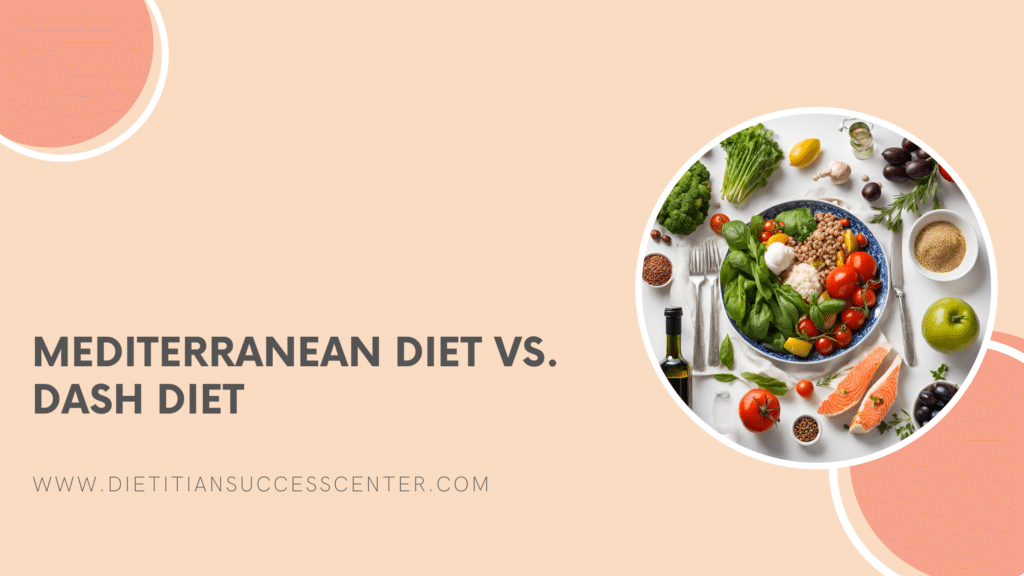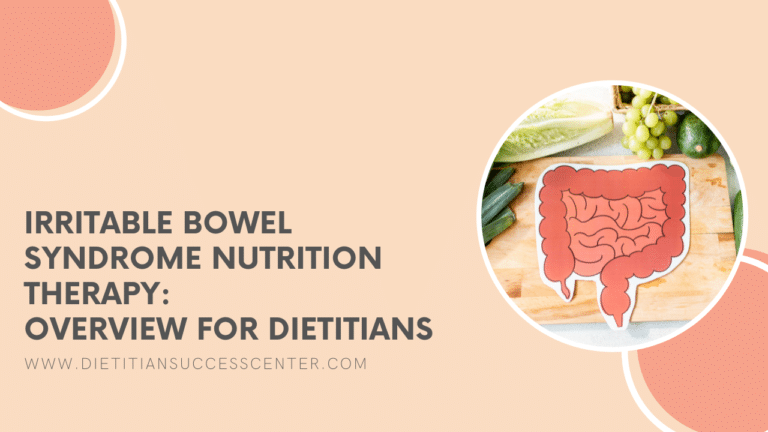

Written by Olivia Farrow, RD, MHSc
Reviewed by Maria Dellanina, RDN
As nutrition professionals, we often encounter clients seeking guidance on the best dietary approach for their overall health and specific conditions. This might include discussions about the Mediterranean diet vs. DASH diet.
Both the Mediterranean diet and the DASH (Dietary Approaches to Stop Hypertension) diet have garnered significant attention for their potential health benefits, particularly in cardiovascular health.
In this article, we’ll delve into the key components of each dietary pattern, review the research supporting their efficacy, and provide practical insights for integrating these dietary patterns into practice.
Quick Links
What is the Mediterranean Diet?
The Mediterranean diet (Med Diet) is really more of a pattern of eating than a “diet,” reflecting the traditional historical diets of people living near the coast of the Mediterranean sea. The Med diet emphasizes local, freshly prepared plant foods such as vegetables, fruits, legumes, whole grains, nuts, and olive oil (1,2). This dietary pattern is not just about food but also incorporates lifestyle factors like physical activity, communal dining, and stress reduction (3,4).
Research has indicated that high compliance with the traditional Med Diet is associated with improved cardiovascular health outcomes, including reduced risks of coronary heart disease (CHD), stroke, and overall cardiovascular disease (CVD) (5).
DSC’s Mediterranean Diet Evidence Summary breaks down all of the components of the Med Diet in more detail.
What is the DASH Diet?
The DASH diet was developed to combat hypertension. It focuses on vegetables, fruits, low-fat dairy, whole grains, nuts, legumes, poultry, and fish while limiting red meat, sugars, saturated fats, and sodium (6). This diet offers structured guidelines on portion sizes and food categories which can be adapted to different calorie levels.
Research on the Mediterranean Diet
The Med Diet has been extensively studied and is associated with numerous health benefits, including improved quality of life and reduced polypharmacy (7).
Key benefits include:
- Reduced Risk of Cardiovascular Disease (CVD): The Med Diet’s inclusion of fiber, healthy fats, and anti-inflammatory nutrients like polyphenols from foods such as olive oil, fish, and nuts, contributes to lower total cholesterol, increased HDL cholesterol, decreased inflammation, and reduced oxidative stress, all crucial in CVD prevention (8).
- Prevention and Improvement of Type 2 Diabetes (T2DM): Studies like the PREDIMED trial show improvements in fasting glucose, insulin sensitivity, blood pressure, BMI, and lipid levels with the Med Diet, benefiting individuals with T2DM and pre-diabetes (2,9,10).
- Reduced Risk of Metabolic Syndrome (MetS): High adherence to the Med Diet is linked to lower rates of MetS due to its anti-inflammatory effects, insulin sensitivity improvement, and support for overall metabolism (11).
- Reduced Risk of Certain Cancers: Research indicates that the Med Diet may lower cancer-related mortality, especially for breast, colorectal, head and neck, respiratory, gastric, bladder, and liver cancers, likely due to its antioxidant and anti-inflammatory properties (2,9).
- Improved Mental Health: The Med Diet’s anti-inflammatory and antioxidant effects have shown benefits in reducing depression symptoms, protecting against neuronal damage, and enhancing overall quality of life (12,13,14).
- Improved Cognitive Health and Lowered Dementia Risk: Long-term adherence to the Med Diet may offer cognitive benefits and lower dementia risk, attributed to its nutrient-rich composition and neuroprotective effects (2).
- Healthy Aging: The Med Diet’s anti-inflammatory nutrients support healthy aging by reducing inflammation, promoting gut health, and enhancing overall immunity (11,15,16).
- Improved Gut Health: High fiber, probiotics, and unsaturated fats in the Med Diet promote gut health, though further research is needed to understand its full impact on gut microbiota (2).
While the Med Diet shows promise for conditions like Metabolic Dysfunction-Associated Steatotic Liver Disease (MASLD), Chronic Obstructive Pulmonary Disease (COPD), and bone health, more research is needed to confirm its efficacy in these areas (17,18).
Research on the DASH Diet
The DASH diet has primarily been studied for its potential in reducing blood pressure. Most research into other health and metabolic conditions is based on observational research.
Generally, studies have shown an association with a DASH dietary pattern and the following:
- Hypertension and Prehypertension: Research has consistently supported the role of the DASH diet in reducing blood pressure in individuals with hypertension, as well as individuals at risk of developing hypertension (19,20). Even greater blood pressure effects are found when the DASH diet is combined with sodium restriction (21).
- Reduced Risk of Cardiovascular Disease (CVD): There is some evidence to suggest that a DASH dietary pattern is associated with an overall lowered risk of the development of cardiovascular disease (22).
- Prevention of Type 2 Diabetes (T2DM): A 2017 meta-analysis of prospective studies found that in addition to the Med Diet and Alternative Healthy Eating Index, a DASH dietary pattern was associated with reduced risk of T2DM (23).
- Reduced Risk of Kidney Disease: A 2016 prospective cohort study found that the DASH diet was associated with a reduced risk of kidney disease (24).
- Lowered Risk of Gout: A prospective cohort study found that having a DASH dietary pattern, compared to a standard Western dietary pattern was associated with a lowered risk of the development of gout (25).
Research on the Mediterranean Diet vs. DASH Diet
Most research on the Mediterranean and DASH diets have focused on the potential positive benefits of both, and there is limited evidence available comparing them to one another.
A 2023 randomized controlled trial compared the Mediterranean diet vs. DASH diet in the context of salt restriction among individuals with high-normal blood pressure or mild hypertension (26).
- The study found that while both diets, when combined with salt restriction, led to reductions in blood pressure compared to a control group, the Med Diet showed superiority in lowering office systolic blood pressure compared to the DASH diet and salt restriction alone (26).
- However, both dietary approaches were more effective in lowering blood pressure than salt restriction alone, highlighting their potential benefits for individuals with hypertension or elevated blood pressure levels (26).
Similarities and Differences
Like all dietary pattern approaches, some aspects work better for some individuals than others. Let’s take a closer look at how the Med Diet and the DASH diet compare in terms of their key features and benefits, helping us offer tailored and effective dietary advice to our clients.
Similarities:
- Pattern vs. Diet: Both diets are more of a “dietary pattern,” emphasizing choice and flexibility rather than a strict set of rules or foods to restrict.
- Emphasis on whole plant foods: Both diets emphasize whole foods, vegetables, legumes, whole grains, and fruits as key components of a healthy eating pattern. Both include limited consumption of processed foods, sugars, and saturated fats without strict avoidance.
- Cultural Adaptability: Both can have improvements in adherence with the incorporation of a client’s culturally and regionally relevant foods. This may take extra consideration from the practitioner or client in recommending specific changes to make the dietary pattern more relevant.
Differences:
- Structure: The Med Diet allows for diversity in food choices, serving sizes, and food group variation, while the DASH diet provides more structured guidelines. Some individuals prefer, or have better adherence with, flexibility vs. structure when it comes to dietary changes.
- Fat Composition: The Med Diet promotes healthy fats from sources like olive oil and fatty fish, while the DASH diet focuses on reducing total and saturated fats, emphasizing low-fat dairy.
- Sodium Intake: The DASH diet strongly emphasizes reducing sodium intake, whereas the Med Diet, while generally lower in sodium due to its emphasis on whole foods, does not have specific sodium restrictions.
- Focus on Hypertension: The DASH diet was developed specifically to address hypertension and has extensive research supporting its effectiveness in lowering blood pressure.
- Lifestyle Factors: The Med Diet traditionally emphasizes physical activity, communal dining, and stress reduction as integral components, while the DASH diet primarily focuses on dietary factors.
Key Takeaways
The Mediterranean diet vs. DASH diet, each have their own fundamental components, health benefits, and evidence-based benefits. While both dietary patterns offer substantial advantages such as reduced cardiovascular risks, they exhibit differences in terms of structure, composition, and targeted health areas. Recognizing and understanding how to tailor these dietary patterns into personalized nutrition recommendations can help to lead to more optimal client outcomes.
Consider these practical strategies for integrating these dietary patterns into practice effectively.
- Consider your client’s preferences, cultural food choices, health goals, and stages of change when recommending a dietary pattern.
- In many cases, a hybrid approach that incorporates elements of both the Mediterranean and DASH diets may offer optimal benefits.
- Provide education coupled with nutrition counseling and realistic goal setting and ongoing support to enhance long-term adherence.
- Regularly monitor progress, biomarkers, clinical outcomes, barriers, and client satisfaction to assess the effectiveness of the chosen dietary intervention.
- Create a holistic plan that incorporates practical lifestyle changes where appropriate, such as incorporating more enjoyable movement or physical activity, preparing more foods at home, and/or cooking and eating with others.
To simplify implementation for clients, use Dietitian Success Center’s visual and plain language Mediterranean Diet and DASH Diet resources. These tools break down the components of the Mediterranean and DASH diets in a practical way, making it easier for clients to understand and follow these dietary patterns effectively.
Disclaimer: the information provided in all written materials is for educational purposes only and is not to be used as medical advice or to diagnose or treat a medical disease. It is strictly for informational purposes and is general in nature. Dietitian Success Center Inc. is not responsible and cannot be held liable for any actions or inactions taken related to the information provided. Consult with your local medical provider before implementing any dietary changes. It is hereby understood that the information provided does not replace medical advice provided by your healthcare provider.
References
- Finicelli M, Di Salle A, Galderisi U, Peluso G. The Mediterranean Diet: An Update of the Clinical Trials. Nutrients. 2022 Jul 19;14(14):2956. doi: 10.3390/nu14142956. PMID: 35889911; PMCID: PMC9317652.
- Dominguez LJ, Di Bella G, Veronese N, Barbagallo M. Impact of Mediterranean Diet on Chronic Non-Communicable Diseases and Longevity. Nutrients. 2021 Jun 12;13(6):2028. doi: 10.3390/nu13062028. PMID: 34204683; PMCID: PMC8231595.
- Raymond, J., Morrow, K. 2023. “Medical Nutrition Therapy for Cardiovascular Disease”. In Krause and Mahan’s Food & The Nutrition Care Process: 16th Edition. Chapter 33. Elsevier, Inc.
- López-González L, Becerra-Tomás N, Babio N, Martínez-González MÁ, Díaz-López A, Corella D, et al. Variety in fruits and vegetables, diet quality and lifestyle in an older adult mediterranean population. Clin Nutr. 2021 Apr;40(4):1510-1518. doi: 10.1016/j.clnu.2021.02.024. Epub 2021 Feb 24. PMID: 33743286.
- Chiavaroli L, Viguiliouk E, Nishi SK, Blanco Mejia S, Rahelić D, Kahleová H, Salas-Salvadó J, Kendall CW, Sievenpiper JL. DASH Dietary Pattern and Cardiometabolic Outcomes: An Umbrella Review of Systematic Reviews and Meta-Analyses. Nutrients. 2019 Feb 5;11(2):338. doi: 10.3390/nu11020338. PMID: 30764511; PMCID: PMC6413235.
- Guo R, Li N, Yang R, Liao XY, Zhang Y, Zhu BF, Zhao Q, Chen L, Zhang YG, Lei Y. Effects of the Modified DASH Diet on Adults With Elevated Blood Pressure or Hypertension: A Systematic Review and Meta-Analysis. Front Nutr. 2021 Sep 7;8:725020. doi: 10.3389/fnut.2021.725020. Erratum in: Front Nutr. 2021 Oct 05;8:778414. PMID: 34557511; PMCID: PMC8452928.
- Raymond J, Morrow K. “The Mediterranean Diet” in Krause and Mahan’s Food & The Nutrition Care Process. 16th ed. Elsevier, Inc; 2023. pp 1148-1149.
- Kiani AK, Medori MC, Bonetti G, Aquilanti B, Velluti V, Matera G, Iaconelli A, Stuppia L, Connelly ST, Herbst KL, Bertelli M. Modern vision of the Mediterranean diet. J Prev Med Hyg. 2022 Oct 17;63(2 Suppl 3):E36-E43. doi: 10.15167/2421-4248/jpmh2022.63.2S3.2745. PMID: 36479477; PMCID: PMC9710405.
- Guasch-Ferré M, Willett WC. The Mediterranean diet and health: a comprehensive overview. J Intern Med. 2021 Sep;290(3):549-566. doi: 10.1111/joim.13333. Epub 2021 Aug 23. PMID: 34423871.
- Escott-Stump S. Nutrition & Diagnosis Related Care. Eighth Ed. Wolters Kluwer; 2015.
- Kiani AK, Medori MC, Bonetti G, Aquilanti B, Velluti V, Matera G, Iaconelli A, Stuppia L, Connelly ST, Herbst KL, Bertelli M. Modern vision of the Mediterranean diet. J Prev Med Hyg. 2022 Oct 17;63(2 Suppl 3):E36-E43. doi: 10.15167/2421-4248/jpmh2022.63.2S3.2745. PMID: 36479477; PMCID: PMC9710405.
- Davis C, Bryan J, Hodgson J, Murphy K. Definition of the Mediterranean Diet; a Literature Review. Nutrients. 2015 Nov 5;7(11):9139-53. doi: 10.3390/nu7115459. PMID: 26556369; PMCID: PMC4663587.
- Gantenbein KV, Kanaka-Gantenbein C. Mediterranean Diet as an Antioxidant: The Impact on Metabolic Health and Overall Wellbeing. Nutrients. 2021 Jun 6;13(6):1951. doi: 10.3390/nu13061951. PMID: 34204057; PMCID: PMC8227318.
- Guasch-Ferré M, Willett WC. The Mediterranean diet and health: a comprehensive overview. J Intern Med. 2021 Sep;290(3):549-566. doi: 10.1111/joim.13333. Epub 2021 Aug 23. PMID: 34423871.
- Bayes J, Schloss J, Sibbritt D. Effects of Polyphenols in a Mediterranean Diet on Symptoms of Depression: A Systematic Literature Review. Adv Nutr. 2020 May 1;11(3):602-615. doi: 10.1093/advances/nmz117. PMID: 31687743; PMCID: PMC7231605.
- Galilea-Zabalza I, Buil-Cosiales P, Salas-Salvadó J, Toledo E, Ortega-Azorín C, Díez-Espino J, et al. Mediterranean diet and quality of life: Baseline cross-sectional analysis of the PREDIMED-PLUS trial. PLoS One. 2018 Jun 18;13(6):e0198974. doi: 10.1371/journal.pone.0198974. PMID: 29912978; PMCID: PMC6005498.
- Lassale C, Batty GD, Baghdadli A, Jacka F, Sánchez-Villegas A, Kivimäki M, Akbaraly T. Healthy dietary indices and risk of depressive outcomes: a systematic review and meta-analysis of observational studies. Mol Psychiatry. 2019 Jul;24(7):965-986. doi: 10.1038/s41380-018-0237-8. Epub 2018 Sep 26. Erratum in: Mol Psychiatry. 2018 Nov 21; Erratum in: Mol Psychiatry. 2021 Jul;26(7):3657. PMID: 30254236; PMCID: PMC6755986.
- Mazza E, Ferro Y, Pujia R, Mare R, Maurotti S, Montalcini T, Pujia A. Mediterranean Diet In Healthy Aging. J Nutr Health Aging. 2021;25(9):1076-1083. doi: 10.1007/s12603-021-1675-6. PMID: 34725664; PMCID: PMC8442641.
- Arslan S, Bozkurt C, Arslan M, Bulut H. Effects of adherence to the Mediterranean diet on fatigue and activities of daily living in geriatric individuals with COPD. Clin Nutr ESPEN. 2023 Apr;54:436-442. doi: 10.1016/j.clnesp.2023.02.019. Epub 2023 Feb 24. PMID: 36963891.
- Anania C, Perla FM, Olivero F, Pacifico L, Chiesa C. Mediterranean diet and nonalcoholic fatty liver disease. World J Gastroenterol. 2018 May 21;24(19):2083-2094. doi: 10.3748/wjg.v24.i19.2083. PMID: 29785077; PMCID: PMC5960814.
- Byberg L, Bellavia A, Larsson SC, Orsini N, Wolk A, Michaëlsson K. Mediterranean Diet and Hip Fracture in Swedish Men and Women. J Bone Miner Res. 2016 Dec;31(12):2098-2105. doi: 10.1002/jbmr.2896. Epub 2016 Sep 8. PMID: 27345330.
- Steinberg D, Bennett GG, Svetkey L. The DASH Diet, 20 Years Later. JAMA. 2017 Apr 18;317(15):1529-1530. doi: 10.1001/jama.2017.1628. PMID: 28278326; PMCID: PMC5509411.
- Saneei P, Salehi-Abargouei A, Esmaillzadeh A, Azadbakht L. Influence of Dietary Approaches to Stop Hypertension (DASH) diet on blood pressure: a systematic review and meta-analysis on randomized controlled trials. Nutr Metab Cardiovasc Dis. 2014 Dec;24(12):1253-61. doi: 10.1016/j.numecd.2014.06.008. Epub 2014 Jun 27. PMID: 25149893.
- Sacks FM, Svetkey LP, Vollmer WM, Appel LJ, Bray GA, Harsha D, Obarzanek E, Conlin PR, Miller ER 3rd, Simons-Morton DG, Karanja N, Lin PH; DASH-Sodium Collaborative Research Group. Effects on blood pressure of reduced dietary sodium and the Dietary Approaches to Stop Hypertension (DASH) diet. DASH-Sodium Collaborative Research Group. N Engl J Med. 2001
- Jeong SY, Wee CC, Kovell LC, Plante TB, Miller ER 3rd, Appel LJ, Mukamal KJ, Juraschek SP. Effects of Diet on 10-Year Atherosclerotic Cardiovascular Disease Risk (from the DASH Trial). Am J Cardiol. 2023 Jan 15;187:10-17. doi: 10.1016/j.amjcard.2022.10.019. Epub 2022 Nov 29. Erratum in: Am J Cardiol. 2024 Apr 1;216:112-113. PMID: 36459731; PMCID: PMC10122756.
- Jannasch F, Kröger J, Schulze MB. Dietary Patterns and Type 2 Diabetes: A Systematic Literature Review and Meta-Analysis of Prospective Studies. J Nutr. 2017 Jun;147(6):1174-1182. doi: 10.3945/jn.116.242552. Epub 2017 Apr 19. PMID: 28424256.
- Rebholz CM, Crews DC, Grams ME, Steffen LM, Levey AS, Miller ER 3rd, Appel LJ, Coresh J. DASH (Dietary Approaches to Stop Hypertension) Diet and Risk of Subsequent Kidney Disease. Am J Kidney Dis. 2016 Dec;68(6):853-861. doi: 10.1053/j.ajkd.2016.05.019. Epub 2016 Aug 9. PMID: 27519166; PMCID: PMC5123940.
- Rai SK, Fung TT, Lu N, Keller SF, Curhan GC, Choi HK. The Dietary Approaches to Stop Hypertension (DASH) diet, Western diet, and risk of gout in men: prospective cohort study. BMJ. 2017 May 9;357:j1794. doi: 10.1136/bmj.j1794. PMID: 28487277; PMCID: PMC5423545.
- Filippou C, Thomopoulos C, Konstantinidis D, Siafi E, Tatakis F, Manta E, Drogkaris S, Polyzos D, Kyriazopoulos K, Grigoriou K, Tousoulis D, Tsioufis K. DASH vs. Mediterranean diet on a salt restriction background in adults with high normal blood pressure or grade 1 hypertension: A randomized controlled trial. Clin Nutr. 2023 Oct;42(10):1807-1816. doi: 10.1016/j.clnu.2023.08.011. Epub 2023 Aug 18. PMID: 37625311.









